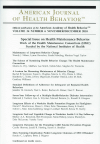
Survey Development to Assess College Students' Perceptions of the Campus Environment
Keywords: COLLEGE; ENVIRONMENT; PERCEPTIONSAM; SURVEY DEVELOPMENT
Document Type: Research Article
Affiliations: 1: Graduate Research Assistant, University of Tennessee, Knoxville, Department of Nutrition, Knoxville, TN 2: Associate Professor, University of Tennessee, Knoxville, Department of Nutrition, Knoxville, TN;, Email: [email protected] 3: Professor, University of Rhode Island, Department of Nutrition and Food Sciences, Kingston, RI 4: Clinical Dietitian, St. Thomas Healthcare System, Nashville, TN 5: Associate Professor, University of Nebraska-Lincoln, Nutrition and Health Sciences Department, Lincoln, NE 6: Associate Professor, West Virginia University, Department of Human Nutrition and Foods, Morgantown, WV 7: Associate Professor, University of Florida, Department of Family, Youth, and Community Science, Gainesville, FL 8: Assistant Professor, Auburn University, Department of Nutrition, Dietetics, and Hospitality Management, Auburn, AL 9: Professor, Syracuse University, Department of Nutrition Science and Dietetics, Syracuse, NY 10: Associate Professor, Kansas State University, Department of Food, Nutrition, and Dietetics, Manhattan, KS 11: Professor, South Dakota State University, Department of Health and Nutritional Sciences, Brookings, SD 12: Professor, University of Maine, School of Food and Agriculture, Orono, ME 13: Assistant Professor, University of Tennessee, Knoxville, Department of Business Analytics and Statistics, Knoxville, TN 14: Graduate Research Assistant, University of Tennessee, Knoxville, Department of Business Analytics and Statistics, Knoxville, TN 15: Professor, Rutgers University, Department of Nutritional Sciences, New Brunswick, NJ
Publication date: 01 November 2017
The American Journal of Health Behavior seeks to improve the quality of life through multidisciplinary health efforts in fostering a better understanding of the multidimensional nature of both individuals and social systems as they relate to health behaviors.
The Journal aims to provide a comprehensive understanding of the impact of personal attributes, personality characteristics, behavior patterns, social structure, and processes on health maintenance, health restoration, and health improvement; to disseminate knowledge of holistic, multidisciplinary approaches to designing and implementing effective health programs; and to showcase health behavior analysis skills that have been proven to affect health improvement and recovery.
- Editorial Board
- Information for Authors
- Submit a Paper
- Subscribe to this Title
- Review Board
- Reprints and Permissions
- Ingenta Connect is not responsible for the content or availability of external websites
- Access Key
- Free content
- Partial Free content
- New content
- Open access content
- Partial Open access content
- Subscribed content
- Partial Subscribed content
- Free trial content